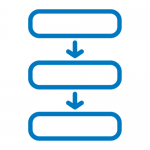About the Program
IN-PERSON | ONLINE
IN-PERSON | ONLINE
Public health is an interdisciplinary field that examines health challenges from multiple perspectives, including societal, social, political and economic. The Advanced Certificate in Public Health consists of the 5 public health core courses: Biostatistics; Epidemiology; Social and Behavioral Health; Environmental Health; and Health Policy and Management.
Completion of this certificate program will prepare students for the Certified in Public Health (CPH) exam, which is the only professional certification in public health. Learn more here: https://www.nbphe.org.
Most students should be able to complete the certificate program in one year.
Students who successfully complete the Public Health Advanced Certificate will be eligible to apply to a CUNY SPH master’s degree program through a streamlined process.
Please note that financial aid and student loans are not available for this certificate program. You may be eligible for payment plans with CUNY. For more information on payment plans, please review the payment options page.
This 15 credit program consists of five core public health courses, enabling students to approach public health problems using evidence-based approaches, tools and methods. This advanced certificate prepares students for the Certified in Public Health (CPH) exam, the only professional certification in public health. Successful completion of this program will enable students to apply to the CUNY MPH degree program through a streamlined process, so students seeking an accelerated and flexible pathway to an MPH or MS in public health should start here.
Students will learn a set of integral skills and knowledge applicable across all public health professions. This program trains students to think critically about the health challenges of populations while gaining a deeper understanding of the multiple factors that lead to these challenges. Whether you aim to excel in public health research, policy or practice, this certificate prepares you to lead with competence, advocate with impact and contribute meaningfully to a more equitable public health.
Students who successfully complete this 15-credit program can take the Certified in Public Health (CPH) exam, which is the only professional certification in public health. The credits earned in the certificate program may be applied to the CUNY MPH program through a streamlined application process, or transferred into academic programs at other institutions (subject to transfer policies). Some students who are already working in the public health field use this certificate to advance their careers at their respective organizations.


For students who began matriculating in Spring 2019 or earlier, please review the previous curriculum for the Advanced Certificate in Public Health here.
| Required Coursework | PUBH 610 Public Health Leadership & Management |
| PUBH 611 Health Equity, Communication, and Advocacy | |
| PUBH 612 Designing and Evaluating Public Health Interventions | |
| PUBH 613 Designs, Concepts, and Methods in Public Health Research | |
| PUBH 614 Quantitative and Qualitative Data Analysis Methods in Public Health Research | |
| Elective Coursework | No Electives Required |
| Practice Experience | No Fieldwork Required |
| Culminating Experience | No Capstone Required |
| Total Credits Required | 15 |

For students beginning their program during the fall semester:
| Semester | Course | Credits |
| Year 1 Fall | PUBH 610: Public Health Leadership and Management | 3 |
| PUBH 611: Health Equity, Communication, and Advocacy | 3 | |
| PUBH 613: Designs, Concepts, and Methods in Public Health Research | 3 | |
| Year 1 Spring | PUBH 612: Designing and Evaluating Public Health Interventions | 3 |
| PUBH 614: Quantitative and Qualitative Data Analysis Methods in Public Health Research | 3 |
For students beginning their program during the spring semester:
| Semester | Course | Credits |
| Year 1 Spring | PUBH 610: Public Health Leadership and Management | 3 |
| PUBH 611: Health Equity, Communication, and Advocacy | 3 | |
| PUBH 613: Designs, Concepts, and Methods in Public Health Research | 3 | |
| Year 1 Fall | PUBH 612: Designing and Evaluating Public Health Interventions | 3 |
| PUBH 614: Quantitative and Qualitative Data Analysis Methods in Public Health Research | 3 |
